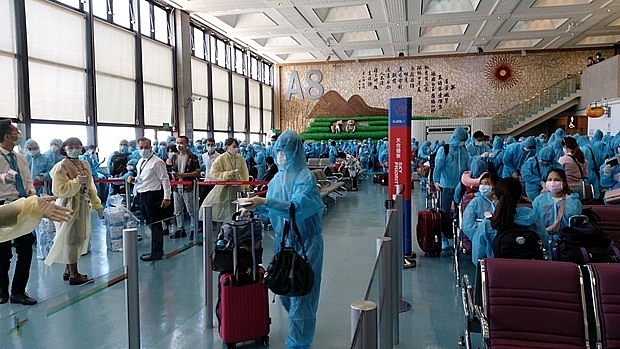Returning workers face unemployment at home
 |
| Vietnamese citizens wait for boarding procedures to be handled at the airport in Taiwan (Photo: VNA) |
Nguyen Hien is among 243 pregnant women who were repatriated from Taiwan on one of Vietnam’s special rescue flights in May. Hien has worked for a golf-club manufacturing company in Taiwan for nearly three years. Now, she has returned to her hometown in the central province of Quang Tri to give birth while her husband will stay in Taiwan to earn money.
She shared that many companies in Taiwan cut work shifts from five to three days. Some companies even cut jobs due to the lack of orders. Fortunately, her husband has been able to extend his employment contract as they need a great deal of cash to cover the expenses for their first child.
It is hard to make ends meet during the COVID-19 crisis, especially with a new mouth to feed. It is also hard for her to find a well-paying job when there are so few jobs in her hometown. She is worried about her future, as many workers are.
Nguyen Nu Thuy Duong, representative of the Human Resources Department of CEO Group, which specialises in sending workers to Japan and China said that both overseas workers and companies are facing extra challenges due to COVID-19. “Many overseas workers are suffering financially as their companies are reducing working hours and incomes,” she said. “The Japanese government supported each foreign labourer ¥100,000 ($943) since the COVID-19 outbreak, hoping to help workers overcome their difficulties. However, people who are not working in Japan any longer cannot receive this support.”
Even labour exporting companies have been suffering from the pandemic. According to Duong, since COVID-19 broke out, no partner from Japan or China has been able to enter Vietnam to seek workers. People who have finalised their documents to fly to a foreign country now have to wait for further notice from the company.
Although working abroad in a country like Japan brings people a fair amount of money, not many people are applying for jobs abroad since the pandemic. “If people want to work abroad, they have to pay for that chance, and the service fee is VND120-250 million ($5,220-10,870), depending on the kind of service,” Duong added.
After paying this fee, they must wait for the recruitment department from the foreign country to get back to them. Thus, people are better off looking for a job opportunity inside the country.
Thanh Le, director of Adecco Vietnam’s Ho Chi Minh Office stated, “As unskilled workers in Vietnam are still struggling to find jobs amid the uncertainty, the unemployment rate in Vietnam is forecast to increase until the end of the year.”
“Based on our latest survey, manufacturing and real estate are the industries hit the worst by the coronavirus pandemic. After returning home, overseas workers will find it especially hard to find jobs in these areas,” he added. “The challenges awaiting them are even larger than the ones facing underemployed workers, whose working hours and salaries have been cut. Once companies start recovering, they will prioritise underemployed workers to ensure business continuity instead of hiring new personnel.”
In the meantime, the countries receiving Vietnamese guest workers consider lockdown measures and flight restrictions, leaving foreign workers stranded overseas after their work contracts expire.
As these overseas workers eventually return, the unemployment rate in Vietnam is increasing. Now, these jobless workers have to somehow make ends meet and secure a future in a landscape where domestic companies are not looking to recruit new workers, and more and more companies are pondering lay-offs.
To solve the problem of unemployment for these overseas workers, Andree Mangels, general director of Adecco Vietnam recommends them to focus on sectors that retained high recruitment demand and are relevant to their skills such as delivery, home appliances, e-commerce, healthcare, industrial production, and agriculture.
What the stars mean:
★ Poor ★ ★ Promising ★★★ Good ★★★★ Very good ★★★★★ Exceptional
 Tag:
Tag:
Themes: Together We Win
- Greater Mekong Subregion executives to discuss sustainable tourism
- TCPVN donates 1,200 medicine bags to COVID-19 patients in southwest
- AB InBev supports orphans with scholarships amid COVID-19
- Evaluating the reach of support in turbulent times
- Gamuda Land grants “Back to School” scholarships to support disadvantaged students
Related Contents
Latest News
More News
- Foreign leaders extend congratulations to Party General Secretary To Lam (January 25, 2026 | 10:01)
- 14th National Party Congress wraps up with success (January 25, 2026 | 09:49)
- Congratulations from VFF Central Committee's int’l partners to 14th National Party Congress (January 25, 2026 | 09:46)
- 14th Party Central Committee unanimously elects To Lam as General Secretary (January 23, 2026 | 16:22)
- Worldwide congratulations underscore confidence in Vietnam’s 14th Party Congress (January 23, 2026 | 09:02)
- Political parties, organisations, int’l friends send congratulations to 14th National Party Congress (January 22, 2026 | 09:33)
- Press release on second working day of 14th National Party Congress (January 22, 2026 | 09:19)
- 14th National Party Congress: Japanese media highlight Vietnam’s growth targets (January 21, 2026 | 09:46)
- 14th National Party Congress: Driving force for Vietnam to continue renewal, innovation, breakthroughs (January 21, 2026 | 09:42)
- Vietnam remains spiritual support for progressive forces: Colombian party leader (January 21, 2026 | 08:00)






















 Mobile Version
Mobile Version